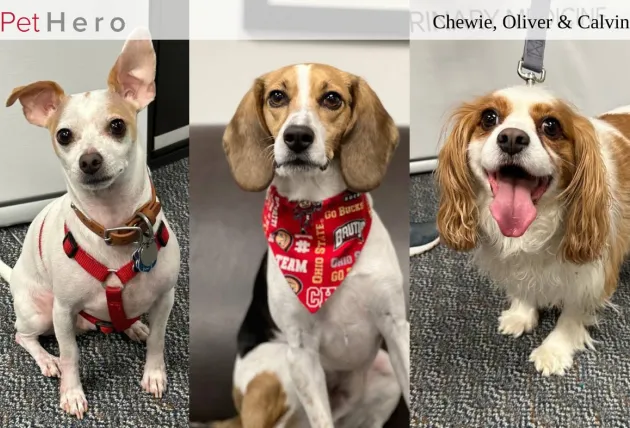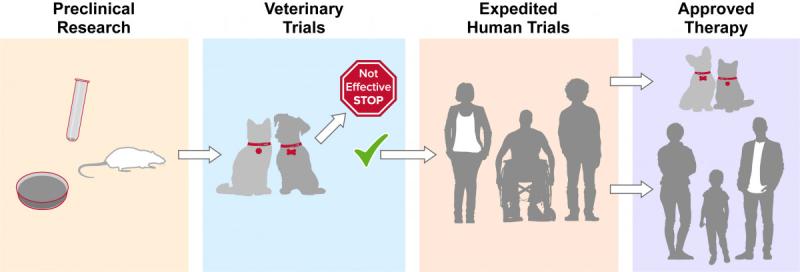Participating in a Clinical Trial
The Blue Buffalo Veterinary Clinical Trials Office (BBVCTO) is staffed by both registered veterinary technicians (RVTs) and veterinarians who have extensive experience in all aspects of clinical trials including study design, patient care, conduct of studies, quality assurance of data and final evaluation of trials.
All clinical trial study protocols are reviewed prior to approval to make sure that all required rules and regulations are closely followed, and that the welfare of all patients entered into studies is ensured.

When a patient arrives at the Ohio State University Veterinary Medical Center and is evaluated by one of the many specialists at our hospital, all potential options for diagnosis and treatment are offered. This may include the potential for enrollment in a clinical trial if the patient is found to be potentially eligible.
Should an owner decide that they are interested in a clinical trial, all the details of the trial will be explained to them, often by a member of the BBVCTO in partnership with the veterinarian in charge of the patient's treatment. After all the necessary requirements for entering and participating in a clinical trial are carefully explained, a consent form must be signed before the patient is screened and can be officially enrolled.
Some clinical trials are relatively short (2-6 weeks) while others may be conducted over several months to possibly a few years. For patients enrolled in clinical trials, care is overseen by both veterinary specialists as well as staff members in the BBVCTO who have extensive experience with patients participating in clinical trials. While enrolled in a clinical trial, visits are typically coordinated by the BBVCTO staff, and efforts are made to ensure that quality of life is maintained or enhanced during the study.
The purpose of clinical trials
Clinical trials are a part of clinical research and are at the heart of all medical advances. The goal of clinical trials is to determine if a new test or treatment works and is safe. Afterward, they may become the standard of care for patients.
Clinical trials can study multiple areas, including:
- New ways to prevent, detect, or treat diseases.
- New drugs, new surgical procedures or devices, or new ways to use existing treatments.
- Improving the quality of life for pets with chronic illnesses.
Veterinary clinical trials require approval by multiple committees before they can start. These committees make sure that the research plan adheres to a standard called Good Clinical Practice, which ensures all data is accurate, patients get the highest level of care, and the patient’s welfare and rights are protected.
What are the benefits of clinical trials?
The specifics of each clinical trial are different, but in general the benefits include:
- Patients will receive the newest treatment or a state-of-the-art treatment that is unavailable outside of the study.
- Access to experts and additional care from clinical trial staff.
- Part or all of the costs associated with the diagnosis and treatment may be covered.
- Participants help other pets or people with the same disease and contribute to advancing human and veterinary medicine.
BBVCTO has partnered with The Ohio State's Comprehensive Cancer Center - James Cancer Hospital and Solove Research Institute and Clinical and Translational Science Institute to provide a comprehensive approach to study and treat diseases in veterinary patients so that both humans and animals benefit from what is learned.
Frequently Asked Questions
Clinical trials are studies in which a new therapy, diagnostic test, or medical device is evaluated in an effort to improve patient care and advance medical knowledge.
When a patient arrives at the Ohio State University Veterinary Medical Center and is evaluated by one of the many specialists who work at our hospital, every potential option for diagnosis and treatment is offered. This may include the potential for enrollment in a clinical trial if the patient is found to be potentially eligible. Should an owner decide that they are interested in a clinical trial, then all the details of that trial are then explained to them, often by a member of the BBVCTO, in partnership with the veterinarian in charge of the patient's treatment.
Clinical trials at the Veterinary Medical Center adhere to a standard called Good Clinical Practice that ensures all data is accurate and patients are provided the highest level of care.
Knowledge from clinical trials and samples from the biospecimen repository are instrumental in advancing the diagnosis and treatment of many conditions, including lung cancer and rheumatoid arthritis. Some of the findings in dogs are often translatable to humans with the same disease, thereby advancing the health of both animals and people, which ultimately improves the quality of life of everyone.
The specifics of each clinical trial are different, but in general the benefits include:
- Patients will receive the newest treatment or a state-of-the-art treatment that is unavailable outside of the study.
- Access to experts and additional care from clinical trial staff.
- Part or all of the costs associated with the diagnosis and treatment may be covered.
- Participants help other pets or people with the same disease and contribute to advancing human and veterinary medicine.
With any clinical trial, there may be some side effects or risks involved. However, all clinical trials performed at the Veterinary Medical Center are reviewed by the Clinical Trials Advisory Committee and must be approved by the Institutional Animal Care and Use Committee (IACUC) at The Ohio State University to ensure the welfare of study participants. Some trials may require a lot of time for traveling to the Veterinary Medical Center for treatments, follow-up exams, or hospital stays. The specific requirements of each study as well as potential study-associated risks are discussed in detail and provided in writing prior to entry into a clinical trial (also known as "informed consent"). This informed consent document must be signed prior to participation in a clinical trial.
Your veterinarian at the Ohio State Veterinary Medical Center (VMC) will work with you to find the best treatment for your pet, including the option of participating in one of the current clinical trials. Whether you decide to participate in a clinical trial or not, your pet will get the best care possible.
If you are interested in a clinical trial, your veterinarian or a BBVCTO technician will explain the details of the trial and answer any questions you may have. Some clinical trials may involve a few extra steps beyond standard treatment, such as blood draws or a new medication. These steps will not cause you or your pet any inconvenience.
The veterinarians and registered veterinary technicians in the BBVCTO work closely with faculty, staff, residents, and interns at the Veterinary Medical Center, as well as participating veterinary clinics and veterinary colleges, to oversee clinical trials and ensure the highest standard of patient care.
If you would like to schedule an appointment please call the Ohio State University Veterinary Medical Center at 614-292-3551. We continually strive to improve the care and treatment of animals, large and small.
For a complete list of our current clinical trials click here.
Please sign up to receive updates about our current clinical trials here, and stay tuned to our website if you do not see a current trial that fits your pet. We are always trying to improve the well-being of our animals and new studies are being added every month.
